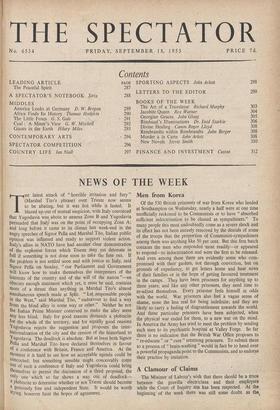Men from Korea
Of the 530 British prisoners of war from Korea who landed at Southampton on Wednesday, nearly a half were at one time unofficially reckoned to be Communists or to have " absorbed sufficient indoctrination to be classed as sympathisers." To many people this must undoubtedly come as a severe shock and its effect has not been entirely removed by the denials of some of the troops that the proportion of Communist-sympathisers among them was anything like 50 per cent. But this first batch contains the men who responded most readily—or appeared to respond—to indoctrination and were the first to be released. And even among these there are evidently some who com- promised with their gaolers, not through conviction, but on grounds of expediency, to get letters home and hear news of their families or in the hope of getting favoured treatment in the camps. They have been prisoners for anything up to three years; and like any other prisoners, they need time to re-adjust themselves. Every prisoner feels himself at odds with the world. War prisoners also feel a vague sense of shame, none the less real for being indefinite; and they are likely to carry a feeling of disgruntlement towards the world. And these particular prisoners have been subjected, when the physical war ended for them, to a new war on the mind. In America the Army has tried to meet the problem by sending such men to its psychiatric hospital at Valley Forge. So far there is no indication that the British War Office proposes to " re-educate " or " cure " returning prisoners. To submit them to a process of " brain-washing " would in fact be to hand over a powerful propaganda point to the Communists, and to endorse their practice by imitation.


































 Previous page
Previous page